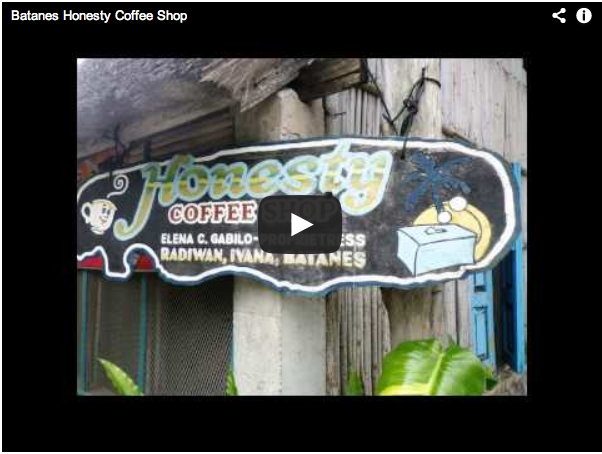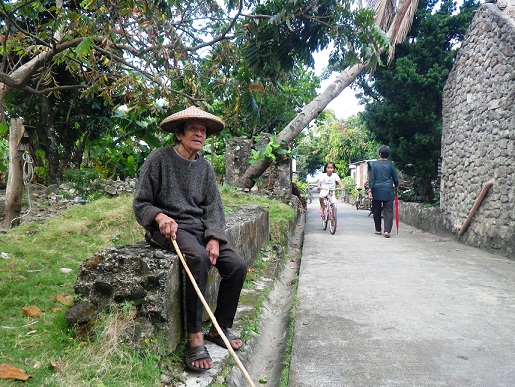Text and photos by NORMAN SISON
IT does not have the ambiance of a coffee shop. It has no barista nor brewed coffee. There is no one to serve you because there is nobody around at all — and that’s why it’s a regular stop for tourists.
The store’s name — Honesty Coffee Shop — speaks more about its service than its products. “Service” there means you serve your self. Just remember to leave your payment.
Honesty Coffee Shop is more like a pit stop or a convenience store. It doesn’t have much, but just enough for a weary traveler — a place to rest and have something to eat and drink. Just like other coffee shops, however, it does sell ceramic souvenir mugs.
It does boast of one ambiance that not many coffee shops have — the distant sound of the sea and coconut trees swaying in the breeze. Behind the store are several huts and then the rocky beach.
Honesty Coffee Shop sits by the main road that runs through the seaside village of Ivana, a town of 1,200 people and 280 households on the southern tip of Batan Island, in the 10-island group of Batanes, the Philippines’ northernmost province.
Batanes straddles the Philippine Sea to the east and the South China Sea to the west. Its northernmost island is closer to Taiwan than to the rest of the Philippines.
Dominating the town is San Jose de Ivana, a Roman Catholic Church built by Spanish colonizers in 1814. It has a commanding view of a five-kilometer wide channel that separates Batan and Sabtang Island to the south.
Ivana is the departure point for ferries bringing tourists to Sabtang, home to the famous stone houses of the indigenous Ivatan people, who inhabited Batanes long before the Spaniards arrived in the 1600s.
Visitors touring San Jose and the ruins of the original church, built in the 1700s behind the present structure, usually drop by Honesty Coffee Shop a few meters away down the road for snacks — and restroom relief.
If it weren’t for the sign outside, the building can easily be mistaken for a hut with its bamboo walls and cogon grass roof. Humble as it may be, however, the store receives enough regular visitors to earn it a spot on Google Maps under the heading “Honesty Cafe”.
Tourists take photos by the sign outside for posting on Facebook and elsewhere online. You cannot get better advertisement than that.
If you want to pose with a traditional vakul palm leaf headgear, worn by Ivatan women, or the talugong, a woven hat worn by the men, the store rents them out for 20 pesos each.
Inside, only a sign on the wall from the store owners, Joe and Elena Gabilo, is on hand to greet visitors. Another sign lists instructions for newcomers on how to make purchases. All the items have price tags.
Step one: “Self service po lamang dito”, meaning “self service here only”.
Step two: “Get what you like and pay or drop your payment at the shelf.” There is a ledger on a counter where you pencil down what you got and how much. The cash register is nothing but a drinking glass. Put your money in there and get your change.
If there is not enough money for change, you go to step three: “You give more if you have no exact money. The Lord will give you more later on … so may your tribe increase!” Of course, if you paid less than you should, then you missed the point. And if you paid more than you should, then have faith that you will be blessed by your good deed.
Step four is about a lesson that the cafe’s owners wish that you take with you: “In your journey remember the Golden Rule and that honesty is the best policy.” As you leave, step five: “Have a good time and happy trip.” Finally, step six: “Goodbye and may God bless us all! Thank you!”
It all began in 1995 when Elena Gabilo, a retired teacher, saw fishermen going out to sea in the cold of night at a pier near her house. Feeling empathy, she left coffee in a thermos for them on the counter. A few weeks later she found some money left behind.
Today, Honesty Coffee Shop offers snacks, bottled water, soda, corn, shirts and other souvenirs for tourists.
For local and foreign tourists, the store reminds them of a human virtue that can easily be shunted aside by the demands of modern living where everybody seems to be in a rat race. A sign on the store encapsulates its business philosophy in one line: “This store is too small for dishonest people.”
Batanes’ isolation may partly be the reason why a store like Honesty Coffee Shop can survive. It is a faraway place where life is simple, almost everybody knows each other and crime is nonexistent. If disaster strikes, all the people have there is each other.
Honesty Coffee Shop provides comfort in the thought that a store in the middle of nowhere can prove that virtue still lives in the hearts of people for whom dishonesty is the norm in the big city.
As one Ivatan proverb goes: “Ipangudidi mu u mapya nanawu.” It means, “Carry with you good teaching, always bear in mind sound advice.”

